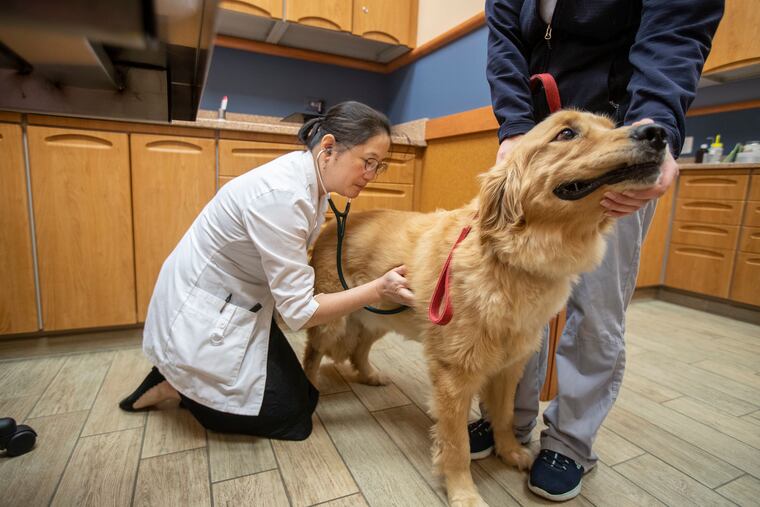Fur-baby sick? Wharton MBA launches start-up, taking telemedicine to pets’ parents.
Animal lovers need veterinarians during the pandemic, and telemedicine for pets arrives just in time.

My Virtual Veterinarian, founded by Wharton School graduate Felicity Johnson, is a veterinary portal for pet owners, and allows animals to receive medical care any time they need it — all through telemedicine.
My Virtual Veterinarian won the University of Pennsylvania’s Wharton School’s latest entrepreneurship competition this year, which, like the winning idea, was done virtually amid the COVID-19 health crisis.
The app, which received a $30,000 prize plus $15,000 in legal, accounting and strategy services, connects pet parents with doctors for video and chat appointments, providing what has become an essential service during the pandemic.
Johnson founded the company in 2019 while studying for her MBA at Wharton. Years earlier, she’d experienced time-consuming medical visits when her cat, Tiffany, was diagnosed with cancer.
“I was living and working in New York City, and it was difficult bringing her to her appointments,” said Johnson, a native of Australia whose family moved to Philly when she was a child. She graduated from Episcopal Academy in Newtown Square and Villanova University. “I was very fortunate to be working at Rent the Runway,” an online fashion company that allowed flex time working from home.
“That’s the challenge a lot of pet owners face: The vet appointments are in the middle of the work day.”
The virus has accelerated the tele-doctor trend already popular with humans, she said.
On March 24, regulators gave her idea a surprise boost.
“The FDA suspended regulations that required vets to establish a client-patient relationship before practicing telemedicine,” she said. “That is just unprecedented. Before the pandemic, vets really were not using telemedicine — they were extremely wary.”
The market was ripe for innovation. The American Pet Products Association data show that two-thirds of 84.9 million U.S. households have at least one pet, offering steady demand for routine veterinary services.
.
Americans spent more than $25 billion on vet services in 2018, according to data from Freedonia Group, and that number should increase. Industry growth between 2015 and 2020 averaged 2.9% annually, according to IBIS World.
Through the My Virtual Veterinarian iOS app, pet parents can access their primary veterinarian, or find a different one who is available, and schedule an appointment. This flexibility extends to the veterinarians, who can schedule appointments that fit their schedule.
» FAQ: Your coronavirus questions, answered.
Competitors include AirVet and TeleTails, but Johnson contends that the competitors’ apps "lock you into using only one veterinarian. With us, you can choose your own vet,” or any vet available as long as they sign up for the platform.
Her company makes money by taking a percentage of appointment fees, which vary among animal doctors. “We don’t charge the vets to use the app, we charge the pet parents,” she said, generally 30% of the appointment fee.
With 150 million dogs and cats in America, and an average cost of $50 per appointment, MyVirtualVet app’s goal is a little more than $14 in gross profit per visit.
So far, My Virtual Veterinarian has completed 51 appointments and 16 chats with doctors. The company has four employees, including Johnson, who taught herself to code.
Plans for growth include hosting “Paws for Wellness” pop-up wellness clinics in major cities to introduce pet parents to the platform, as well as partnerships with groomers and insurers.
And, of course, custom poop bags in local dog parks to advertise the service.
Penn Wharton Entrepreneurship winners
My Virtual Veterinarian won out in a field of eight finalist teams — including tropical fruit ice cream and curated flower rental companies — who advanced from almost 30 semifinalists in the competition.
Perlman Grand Prize: $30,000 + $15,000 in legal, accounting and strategy services to My Virtual Veterinarian.
Runner-up: Percepta. Ease the financial and social impact of shoplifting, but do it ethically without targeting shoppers based on race, gender, or other demographics.
Innovation Award: MAR Designs. Specialized orthotic that improves wrist function in children with cerebral palsy.
Launch Prize: Frutero Ice Cream. A tropical fruit ice cream company.
Rent the Rose: Sustainable flower arrangements in a rental model direct to organizations and individuals for special events.
Aureum: a digital primary-care provider for white-collar professionals in China.
Showcase: Consumers get free items, in exchange for a quick survey, and brands get targeted, high-quality, in-moment data.
The Lobby: A premium, members-only social club for adult-age video game enthusiasts.